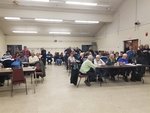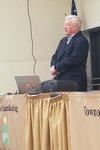WURTSBORO — Fred Harding, chair of the Mamakating Local Development Corporation (MLDC), gave a presentation on acquiring the Wurtsboro Airport on November 13 at the town hall.
The charrette …
This item is available in full to subscribers.
Please log in to continue |


WURTSBORO — Fred Harding, chair of the Mamakating Local Development Corporation (MLDC), gave a presentation on acquiring the Wurtsboro Airport on November 13 at the town hall.
The charrette drew in residents from all over last Wednesday night to hear the history, the financial information to obtain the airport, and the different opinions of the local residents.
Near the beginning of the presentation, Randy Cochran, a member of the MLDC, noted that the town's acquisition of the airport was a “great opportunity,” especially with all the development occurring in the region from Legoland, the Resorts World Catskills Casino, and Kartrite Indoor Waterpark to Mamakating's natural attractions like the Basha Kill. Cochran noted that “we need more visitation” to Mamakating in order for it to grow and flourish.
A brief history
The Wurtsboro Airport began operating in 1927 and has been fully operational since then. Lee Lord first operated the airport and gave flying lessons from 1927 into the 1930s. Anthony and Theresa Barone bought the airport in the 1940s, and with their children, owned and operated it until 2006 when Shalom Lamm bought it.
Lamm has been operating the airport since 2006 and is now looking to sell the airport and approximately 141 surrounding acres of land with it.
The Wurtsboro Airport is considered the oldest soaring airport to date in the United States. This fact is the driving force of the town's and residents' interest. The historical significance as well as the flying activities are the motivating factors to bring in more tourism, revenue, and perhaps, more residents.
By the numbers
According to Harding, the appraised value of the airport as of May 17, 2017 is $2,825,315. This appraisal is expected to be updated, and according to Fred Harding, the airport will be appraised to be worth more than the current appraisal.
The purchase price of the airport is $2,500,000 as of November 13, 2019, which Harding noted that the price is lower than the appraised value of the airport. There is also a grant by the FAA available to help pay for the airport. Harding also presented the tax implications, saying that for the General Fund and the Highway Fund for Mamakating's taxes would be impacted $1.20 for every $1,000 of taxes paid. In other words, the airport would cost tax payers .12 percent of the budget using 2019 numbers.
Harding cited a 2010 New York Economic Impact of Aviation Study that said “the direct and indirect economic impact of Wurtsboro Airport was $1,626,500.”
Harding then presented the revenue numbers that the airport currently earns now and what the town expects the airport to, what Harding says, “conservatively” earn after the purchase.
The “post acquisition project[ed]” revenue is expected to be $272,498 per year. Harding then presented the expenses the airport has currently and the expenses that the town expects to have after the acquisition. The expenses expected after the acquisition is $165,368 leaving a $107,131 net operating income.
Harding noted repeatedly throughout the presentation that all of these numbers are expected to be confirmed during due diligence. Harding remarked that if the numbers are not correct at that time, there will have to be corrections made or the process would have to be started over.
Harding then discussed the bond options that the town board might choose. The town could choose to use a $500,000 surplus from 2019's budget to lower the payments per year. The numbers differed slightly but averaged around a $100,000 payment per year to pay off the airport. Harding noted that with his “conservative” or “worst case scenario” net operating income, the airport will “pay for itself.”
Harding summarized his presentation with the slide, “As the number of pilots using the airport increases and the number of tourists attending other events grows, so does the economic impact for the town. The greater the economic impact, the less the tax pressure on the residential taxpayer. The return on this investment should help reduce (or at least stabilize) your taxes for many years in the future.”
Acquisition Draws Praise and Criticism
Harding received praise from many residents, even those who disagreed with the acquisition, that the presentation was detailed and presented necessary information. Many residents came to the podium to ask questions, voice their concerns, and at times, comment on other residents' points.
James Arnott, Superintendent of the Sullivan County Airport, mentioned that the FAA grant that Harding mentioned comes with strict regulations that the airport would be locked into for the next 20 years. More details of the regulations will be given at a later date, but only aviation activities can be done on the airport premises. In addition, the income generated by the airport can only be used to maintain the airport. Harding noted that this is true, but that the existing open acreage outside of the airport can be used for anything as long as it is safe to occur alongside a working airport.
Some of the major arguments against or criticisms for buying the airport were: there should be a focus on the infrastructure of Mamakating, and the town should not be involved in real estate because if it fails, it falls on the taxpayer.
The major praises or reasons for support of the acquisition are that it is a rare opportunity that has the potential to bring in more tourism and, if the town does not buy the airport, it is uncertain what will happen to the airport itself and the surrounding acreage.
Rob Hufcut, the Highway Superintendent elect, was passionate in his speech about safety. He said the town “is putting wants in front of needs.” Hufcut told the crowd that there are bridges currently in the town of Mamakating that should not be driven on. The priority should be on fixing the roads and bridges and “if something happens” on those bridges, “everyone who voted [for the acquisition] will have to live with it.” He asked the crowd, “Isn't safety most important?” Hufcut ended his speech by noting that the numbers Harding presented were “not facts, just projections,” and he hopes that the town uses the $500,000 surplus for safety.
Harding noted that the town does not have to use the $500,000 surplus towards this project and that the town can “do both.”
Richie Dunn, a member of the Mamakating Highway Department, followed up Hufcut's statement by saying that the airport is a “great idea, but [the airport] needs to be privately owned.”
Dunn noted that what sounds good on paper is not always the case, but the airport could easily “turn into a money pit” that should not be left to the tax payers to foot the bill. Dunn agreed that the airport should be preserved, and it may help businesses, but it won't necessarily help the fire districts, and schools, etc…
Jim Barnett, a former member of the zoning board, called the whole proposal “nonsense.” He said that the airport is probably not the money maker it appears to be. Barnett said, “Nobody is beating the door down” to buy the airport.
Kent Findley, a current member of the zoning board, took to the podium and declared that he thought there is definite opportunities with the airport. He also told the crowd not to buy into Hufcut's “scare tactic.” Findley reminded the crowd that bridges need to be inspected, so if something happens, it is the highway department's responsibility—not the town's.
Several residents came up to the podium concerned about what may happen to the land if the town does not purchase the airport.
Harding noted that the surrounding acreage can be developed in anyway by a private owner as long as zoning allows, and zoning can always be changed.
Harding continued by stating the airport can only be sold as an airport or abandoned, and the surrounding land may be subject to development the town does not agree with. The only way to definitively control the land is to own it.
Harding's backup plan if the worst-case scenario occurs is that the surrounding acreage can be sold to a reputable buyer later on to offset debt.
A few residents noted that they would not mind paying a few extra dollars to have control over that land, so it will not be developed into something undesirable.
Thomas Morrow, councilman elect for the Mamakating Town Board, told Hufcut “to do what [he] needs to do come January 1.” He said that he did not think Hufcut was using “a scare tactic,” and he may have to shut down some bridges. He also noted that there will be a new town board with a whole new set of opinions in 6 weeks, and that this new town board may be left with a 25-plus year bond that it did not vote for.
Harding reminded everyone that it may be the current board or the next town board that votes on the acquisition. The bond has to go through due diligence first, and if the town board votes to buy the airport, with enough signatures, the approval of the bond is subject to public vote.
One of the final public comments came from Kathy Dawkins, and she noted that “an investment project” like the airport is different from an ongoing investment project like the roads and bridges. She stated that it does not have to be one or the other. Both projects could be accomplished.
At the end of the charette, Harding passed around surveys to get an idea of where public opinion on the acquisition was after the meeting.
Comments
No comments on this item Please log in to comment by clicking here